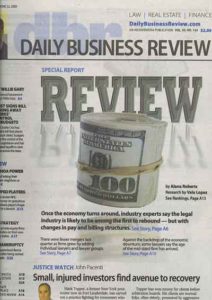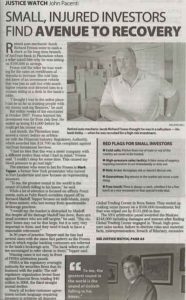..as reported in the Daily Business Review


JUSTICE WATCH
Small, injured investors find avenue to recovery
by John Pacenti
Mark Tepper, a former New York prosecutor now in Fort Lauderdale, has carved out a practice fighting for consumers who lost money to questionable brokerage practices. It’s not big money – except to those who lost it.
Tepper has won money for clients before arbitration boards. His clients are normal folks, often elderly, pressured by aggressive sales tactics, enticed by free lunches or surprised by fees.
Retired auto mechanic Jacob Richard Froess went to cash a check at his long-time branch of AmTrust Bank in Plantation, Fla., when a teller asked him why he was sitting on $100,000 in savings.
Froess told the teller he was waiting for the rates on certificates of deposits to increase. She told him she knew of an investment vehicle that was just as safe but with much higher returns and directed him to a woman sitting at a desk in the bank’s lobby.
“I thought I was in the safest place I can be as far as trusting people with my money and my finances,” he said.
But within weeks of the encounter in October 2007, Froess learned his investment was far from risk-free. He ended up losing $14,000 before he could get his money out.
Last month, the Plantation man scored a victory before an arbitrator with the Financial Industry Regulatory Authority, which awarded him $18,700 on his complaint against AmTrust Investment Services.
“I had no idea that this was a sister company with a different motive than what I had in mind,” Froess said. “I couldn’t sleep for some time. This caused my blood pressure to go real high.”
The attorney who went to bat for Froess is Mark Tepper, a former New York prosecutor who moved to Fort Lauderdale and now focuses on representing investors.
“To me, the greatest sound in the world is the sound of Goliath falling to his knees,” he said.
While a lot of attention is focused on affinity Ponzi scams, such as Palm Beach socialites ripped off by Bernard Madoff, Tepper focuses on individuals, many of them seniors, who lost money to questionable brokerage practices.
“I would say the market is distracted by Madoff. But despite all the damage Madoff has done, there are small investors who are still targets,” he said. “The victims’ losses may not be that large, but it is very, very important to them, and they need it back to have a reasonable retirement.”
In 30 years of practice, Tepper said he has had several cases with the same fact pattern as the Froess case in which regular banking customers are referred to the bank’s brokerage arm. “The bank tellers are often encouraged to refer clients to them,” Tepper said.
Winning cases is not easy in front of FINRA arbitration panels.
FINRA is the regulatory oversight authority for securities firms that do business with the public. The self-regulatory organization levied fines against financial firms totaling $40 million in 2008, the third straight annual decline.
Nearly all broker-customer agreements include language requiring investors to arbitrate all disputes with brokers in front of an arbitration panel rather than state or federal court.
“Most plaintiff attorneys will say it is tilted towards the defendants because you have an industry person on the panel,” said Eric Norstedt, a Davie, Fla., practitioner who represents small investors.
“It’s difficult, and it’s more expensive than court,” Norstedt said. “But it’s becoming more like court. You have motions, calendar calls, discovery requests. You are lucky to get a hearing done in five days.”
Tepper also had success in front of an arbitration panel for the National Futures Association, fighting for an Canadian couple who found him on the Web.
Jason and Joyce Blaikie, who live near Edmonton, received an unsolicited call from a broker promising big returns in the futures market if they invested with Global Trading
Center in Boca Raton. They ended up making some money on a $100,000 investment, but that was wiped out by $125,000 in fees.
The NFA arbitration panel awarded the Blaikies $248,000 including damages and interest after finding Global Trading Center engaged in “fraud, high-pressure sales tactics, failure to disclose risks and material facts, misrepresentation, breach of fiduciary, excessive trading, excessive commissions, unauthorized trading.”
“Don’t believe everything you hear,” Joyce Blaikie said. “If there’s high-pressure sales, then there is a problem. Walk away from it. And if you get a cold call with someone saying this investment is for you and it’s a sure thing and there’s absolutely no way to lose money, don’t believe that either.”
While the Blaikies are a middle-aged, working-class couple, senior citizens are particularly vulnerable to cold calls from boiler room frauds, Norstedt said.
“You have these young brokers calling them up and preying on their loneliness,” he said. “They engage in dialogue, and all of a sudden they turn the conversation in the direction of money.”
Some investment brokerages lure customers with offers of free lunches at fine restaurants.
“Sometimes these free lunches are legitimate, and sometimes they are used to exploit the elderly,” Tepper said. “When you go and are given an expensive lunch, you feel kind of beholden to somebody. Somebody did something nice for you. The free lunch plays on human nature.”
Tepper also won a FINRA case for 83-year-old woman in May on a complaint against Merrill Lynch. She put her life savings in a Fannie Mae fund when she had asked for a variety of investments.
Sylvia Ferber of Plantation insisted the money be taken out of the fund when she lost $7,000 in one month, but the broker insisted it was a safe investment. Fannie Mae collapsed a month later. The FINRA panel awarded her nearly $24,000.
In retrospect, Tepper said it may look like these investors should have known better, but they are fairly typical.
Norstedt said investors can go online at the FINRA Web site and investigate brokers and learn of any complaints filed against them.
“Most people do not have the training or experience or the knowledge to independently evaluate whether or not to trust a broker,” Tepper said. “Just like most people don’t know how to evaluate a doctor’s diagnosis. They just trust it.”

